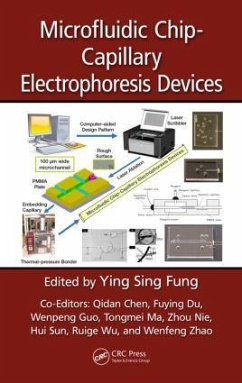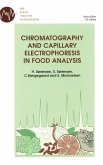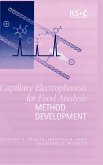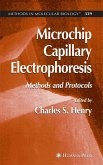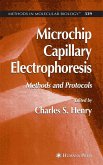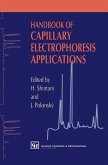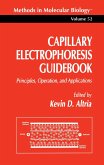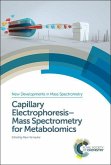Microfluidic Chip-Capillary Electrophoresis Devices
Herausgeber: Fung, Ying Sing; Zhao, Wenfeng; Wu, Ruige; Sun, Hui; Nie, Zhou; Ma, Tongmei; Guo, Wenpeng; Du, Fuying; Chen, Qidan
Schade – dieser Artikel ist leider ausverkauft. Sobald wir wissen, ob und wann der Artikel wieder verfügbar ist, informieren wir Sie an dieser Stelle.
Microfluidic Chip-Capillary Electrophoresis Devices
Herausgeber: Fung, Ying Sing; Zhao, Wenfeng; Wu, Ruige; Sun, Hui; Nie, Zhou; Ma, Tongmei; Guo, Wenpeng; Du, Fuying; Chen, Qidan
- Gebundenes Buch
- Merkliste
- Auf die Merkliste
- Bewerten Bewerten
- Teilen
- Produkt teilen
- Produkterinnerung
- Produkterinnerung
Capillary electrophoresis (CE) and microfluidic chip (MC) devices are relatively mature technologies, but this book demonstrates how they can be integrated into a single, revolutionary device that can provide on-site analysis of samples when laboratory services are unavailable. By introducing the combination of CE and MC technology, Microfluidic Chip-Capillary Electrophoresis Devices broadens the scope of chemical analysis, particularly in the biomedical, food, and environmental sciences.
Andere Kunden interessierten sich auch für
![Chromatography and Capillary Electrophoresis in Food Analysis Chromatography and Capillary Electrophoresis in Food Analysis]() Hilmer SorensenChromatography and Capillary Electrophoresis in Food Analysis103,99 €
Hilmer SorensenChromatography and Capillary Electrophoresis in Food Analysis103,99 €![Capillary Electrophoresis for Food Analysis Capillary Electrophoresis for Food Analysis]() Richard A FrazierCapillary Electrophoresis for Food Analysis111,99 €
Richard A FrazierCapillary Electrophoresis for Food Analysis111,99 €![Microchip Capillary Electrophoresis Microchip Capillary Electrophoresis]() Charles Henry (ed.)Microchip Capillary Electrophoresis122,99 €
Charles Henry (ed.)Microchip Capillary Electrophoresis122,99 €![Microchip Capillary Electrophoresis Microchip Capillary Electrophoresis]() Microchip Capillary Electrophoresis77,99 €
Microchip Capillary Electrophoresis77,99 €![Handbook of Capillary Electrophoresis Applications Handbook of Capillary Electrophoresis Applications]() H. ShintaniHandbook of Capillary Electrophoresis Applications243,99 €
H. ShintaniHandbook of Capillary Electrophoresis Applications243,99 €![Capillary Electrophoresis Guidebook Capillary Electrophoresis Guidebook]() Kevin D. AltriaCapillary Electrophoresis Guidebook122,99 €
Kevin D. AltriaCapillary Electrophoresis Guidebook122,99 €![Capillary Electrophoresis-Mass Spectrometry for Metabolomics Capillary Electrophoresis-Mass Spectrometry for Metabolomics]() Capillary Electrophoresis-Mass Spectrometry for Metabolomics234,99 €
Capillary Electrophoresis-Mass Spectrometry for Metabolomics234,99 €-
-
-
Capillary electrophoresis (CE) and microfluidic chip (MC) devices are relatively mature technologies, but this book demonstrates how they can be integrated into a single, revolutionary device that can provide on-site analysis of samples when laboratory services are unavailable. By introducing the combination of CE and MC technology, Microfluidic Chip-Capillary Electrophoresis Devices broadens the scope of chemical analysis, particularly in the biomedical, food, and environmental sciences.
Produktdetails
- Produktdetails
- Verlag: CRC Press
- Seitenzahl: 396
- Erscheinungstermin: 25. August 2015
- Englisch
- Abmessung: 234mm x 157mm x 28mm
- Gewicht: 635g
- ISBN-13: 9781482251647
- ISBN-10: 1482251647
- Artikelnr.: 42472737
- Herstellerkennzeichnung
- Libri GmbH
- Europaallee 1
- 36244 Bad Hersfeld
- gpsr@libri.de
- Verlag: CRC Press
- Seitenzahl: 396
- Erscheinungstermin: 25. August 2015
- Englisch
- Abmessung: 234mm x 157mm x 28mm
- Gewicht: 635g
- ISBN-13: 9781482251647
- ISBN-10: 1482251647
- Artikelnr.: 42472737
- Herstellerkennzeichnung
- Libri GmbH
- Europaallee 1
- 36244 Bad Hersfeld
- gpsr@libri.de
Dr. Ying Sing Fung received his BSc and MPhil from the University of Hong Kong, Hong Kong SAR, China, in 1975 and 1977, respectively, and his PhD from the Imperial College of Science, Technology and Medicine, University of London, United Kingdom, in 1980. He is currently associate professor in the Department of Chemistry at the University of Hong Kong. He has been a member of the editorial board of Journal of Chemical Education (Chinese Chemical Society) and Journal of Biochemical and Biophysical Methods (Elsevier Science, the Netherlands). He holds four patents and has authored or co-authored 12 books and reviews, more than 130 journal articles, and 290 conference papers. Dr. Qidan Chen received her PhD from the University of Hong Kong, Hong Kong SAR, China, in 2010. She is associate professor at Zhuhai College, Jilin University. Her research interests include the application of nanomaterial in microfluidic-chip capillary electrophoresis (MC-CE) devices and in food testing research, using various international advanced technologies based on semiconductor nanoparticles, microfluidic electrophoresis devices, and laser fabrication techniques, and the development of novel analytical methodology for the determination of toxic environmental pollutants and new analytical methods for the determination of contaminants in food. She has more than 20 publications in journals and presentations at international conference proceedings. She is a co-editor of this book and the principal author of chapters 10 and 11. Dr. Fuying Du received her PhD from the University of Hong Kong, Hong Kong SAR, China, in 2012. She took a postdoctoral position in the Department of Water Quality Engineering, Wuhan University for two years prior to appointment to her current position as a lecturer in the Department of Water Quality Engineering, Wuhan University. Her research interests include electrochemical sensor and electrochemical bio
Microfluidic Chip-Capillary Electrophoresis: Expanding the Scope of
Application for On-Site Analysis of Difficult Samples. Instrumentation and
Facilities I: Fabrication of Microfluidic Chip-Capillary Electrophoresis
Device. Instrumentation and Facilities II: Manipulating Nanofluids for
Desired Operations to Achieve Intended Application by MC-CE Device.
Single-Channel Mixing: Extending Analytical Range to Handle Samples with
High Analyte Variation for Profiling Urinary Organic and Inorganic Anions.
Dual-Channel Mixing: Standard Addition by Dual-Channel Continuous Flow
Mixing for Assay of Complex Nephrolithiasis Biomarkers in Urine. Sample
Cleanup and Analyte Enrichment: Integrating MIP/SPE with ME-MC-CE Device to
Enhance Sample Cleanup and Multidimensional Analyte Enrichment for Hourly
Determination of Atmospheric Carbonyl Compounds. Enhancing Separation
Efficiency: On-Chip Multidimensional Separation and Determination of
Urinary Proteins by MC-CE Device. Improving Detection Selectivity: MC-CE
Device Integrated with Dual Opposite Carbon-Fiber Microdisk Electrodes
Detection for Determining Polyphenols in Wine. Enhancing Detection
Versatility: MC-CE Device with Serial Dual-Electrode Detection for
Determining Glutathione Disulfide and Glutathione in Pharmaceutical
Supplement. Detecting Optically Inactive Analyte: MC-CE Device Integrated
with QDs/LIF Detection for Determination of Acrylamide in Food. Quantum
Dots-Enhanced Fluorescence Detection: Immobilized Quantum Dots for
Laser-Induced Fluorescence Detection of Organophosphorus Pesticides in
Vegetables. On-Site Assay by Portable UV Detector: MC-CE Device for
Authenification of Chinese Medicine. On-Chip Binding Assay: MC-CE Device
Integrated with Multisegment Circular-Ferrofluid-Driven Micromixing
Injection for Assay of Free Bilirubin and Albumin Residual Binding Capacity
for Bilirubin. Counting Organelles: Direct Counting of Mitochondrial
Numbers. Indirect Assessment of Organelles in Cell Extract: Determination
of M
Application for On-Site Analysis of Difficult Samples. Instrumentation and
Facilities I: Fabrication of Microfluidic Chip-Capillary Electrophoresis
Device. Instrumentation and Facilities II: Manipulating Nanofluids for
Desired Operations to Achieve Intended Application by MC-CE Device.
Single-Channel Mixing: Extending Analytical Range to Handle Samples with
High Analyte Variation for Profiling Urinary Organic and Inorganic Anions.
Dual-Channel Mixing: Standard Addition by Dual-Channel Continuous Flow
Mixing for Assay of Complex Nephrolithiasis Biomarkers in Urine. Sample
Cleanup and Analyte Enrichment: Integrating MIP/SPE with ME-MC-CE Device to
Enhance Sample Cleanup and Multidimensional Analyte Enrichment for Hourly
Determination of Atmospheric Carbonyl Compounds. Enhancing Separation
Efficiency: On-Chip Multidimensional Separation and Determination of
Urinary Proteins by MC-CE Device. Improving Detection Selectivity: MC-CE
Device Integrated with Dual Opposite Carbon-Fiber Microdisk Electrodes
Detection for Determining Polyphenols in Wine. Enhancing Detection
Versatility: MC-CE Device with Serial Dual-Electrode Detection for
Determining Glutathione Disulfide and Glutathione in Pharmaceutical
Supplement. Detecting Optically Inactive Analyte: MC-CE Device Integrated
with QDs/LIF Detection for Determination of Acrylamide in Food. Quantum
Dots-Enhanced Fluorescence Detection: Immobilized Quantum Dots for
Laser-Induced Fluorescence Detection of Organophosphorus Pesticides in
Vegetables. On-Site Assay by Portable UV Detector: MC-CE Device for
Authenification of Chinese Medicine. On-Chip Binding Assay: MC-CE Device
Integrated with Multisegment Circular-Ferrofluid-Driven Micromixing
Injection for Assay of Free Bilirubin and Albumin Residual Binding Capacity
for Bilirubin. Counting Organelles: Direct Counting of Mitochondrial
Numbers. Indirect Assessment of Organelles in Cell Extract: Determination
of M
Microfluidic Chip-Capillary Electrophoresis: Expanding the Scope of
Application for On-Site Analysis of Difficult Samples. Instrumentation and
Facilities I: Fabrication of Microfluidic Chip-Capillary Electrophoresis
Device. Instrumentation and Facilities II: Manipulating Nanofluids for
Desired Operations to Achieve Intended Application by MC-CE Device.
Single-Channel Mixing: Extending Analytical Range to Handle Samples with
High Analyte Variation for Profiling Urinary Organic and Inorganic Anions.
Dual-Channel Mixing: Standard Addition by Dual-Channel Continuous Flow
Mixing for Assay of Complex Nephrolithiasis Biomarkers in Urine. Sample
Cleanup and Analyte Enrichment: Integrating MIP/SPE with ME-MC-CE Device to
Enhance Sample Cleanup and Multidimensional Analyte Enrichment for Hourly
Determination of Atmospheric Carbonyl Compounds. Enhancing Separation
Efficiency: On-Chip Multidimensional Separation and Determination of
Urinary Proteins by MC-CE Device. Improving Detection Selectivity: MC-CE
Device Integrated with Dual Opposite Carbon-Fiber Microdisk Electrodes
Detection for Determining Polyphenols in Wine. Enhancing Detection
Versatility: MC-CE Device with Serial Dual-Electrode Detection for
Determining Glutathione Disulfide and Glutathione in Pharmaceutical
Supplement. Detecting Optically Inactive Analyte: MC-CE Device Integrated
with QDs/LIF Detection for Determination of Acrylamide in Food. Quantum
Dots-Enhanced Fluorescence Detection: Immobilized Quantum Dots for
Laser-Induced Fluorescence Detection of Organophosphorus Pesticides in
Vegetables. On-Site Assay by Portable UV Detector: MC-CE Device for
Authenification of Chinese Medicine. On-Chip Binding Assay: MC-CE Device
Integrated with Multisegment Circular-Ferrofluid-Driven Micromixing
Injection for Assay of Free Bilirubin and Albumin Residual Binding Capacity
for Bilirubin. Counting Organelles: Direct Counting of Mitochondrial
Numbers. Indirect Assessment of Organelles in Cell Extract: Determination
of M
Application for On-Site Analysis of Difficult Samples. Instrumentation and
Facilities I: Fabrication of Microfluidic Chip-Capillary Electrophoresis
Device. Instrumentation and Facilities II: Manipulating Nanofluids for
Desired Operations to Achieve Intended Application by MC-CE Device.
Single-Channel Mixing: Extending Analytical Range to Handle Samples with
High Analyte Variation for Profiling Urinary Organic and Inorganic Anions.
Dual-Channel Mixing: Standard Addition by Dual-Channel Continuous Flow
Mixing for Assay of Complex Nephrolithiasis Biomarkers in Urine. Sample
Cleanup and Analyte Enrichment: Integrating MIP/SPE with ME-MC-CE Device to
Enhance Sample Cleanup and Multidimensional Analyte Enrichment for Hourly
Determination of Atmospheric Carbonyl Compounds. Enhancing Separation
Efficiency: On-Chip Multidimensional Separation and Determination of
Urinary Proteins by MC-CE Device. Improving Detection Selectivity: MC-CE
Device Integrated with Dual Opposite Carbon-Fiber Microdisk Electrodes
Detection for Determining Polyphenols in Wine. Enhancing Detection
Versatility: MC-CE Device with Serial Dual-Electrode Detection for
Determining Glutathione Disulfide and Glutathione in Pharmaceutical
Supplement. Detecting Optically Inactive Analyte: MC-CE Device Integrated
with QDs/LIF Detection for Determination of Acrylamide in Food. Quantum
Dots-Enhanced Fluorescence Detection: Immobilized Quantum Dots for
Laser-Induced Fluorescence Detection of Organophosphorus Pesticides in
Vegetables. On-Site Assay by Portable UV Detector: MC-CE Device for
Authenification of Chinese Medicine. On-Chip Binding Assay: MC-CE Device
Integrated with Multisegment Circular-Ferrofluid-Driven Micromixing
Injection for Assay of Free Bilirubin and Albumin Residual Binding Capacity
for Bilirubin. Counting Organelles: Direct Counting of Mitochondrial
Numbers. Indirect Assessment of Organelles in Cell Extract: Determination
of M

